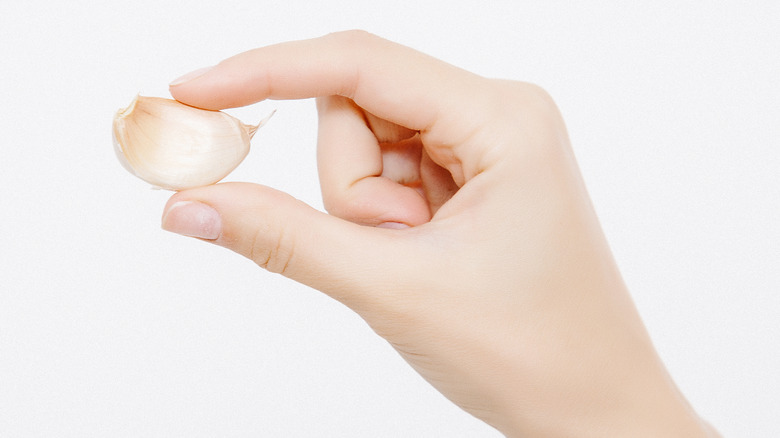Is It Safe To Put Garlic In Your Ear?
There is no shortage of home remedies for treating an earache. One that might seem strange is the use of garlic. Garlic, we know, is a favorite seasoning for many cooks. And in folklore, it's the classic vampire repellent. But can it ward off more than bloodsuckers? It turns out that garlic has antiviral, antibacterial, antifungal, and anti-inflammatory health benefits, and has been used medicinally for hundreds of years (via Healthline). Because of garlic's antiviral and antibacterial properties, can it be considered a safe and effective treatment for ear infections?
First, it's important to note that not all ear infections are the same. Different types of ear infections affect different parts of the ear. According to Verywell Health, inner ear infections impact the deepest portions of the ear, middle ear infections show up behind the eardrum, and an outer ear infection can span from the eardrum to the outside of the ear. Earaches can occur for any number of reasons, including viral infections, bacterial infections like swimmer's ear, or even earwax buildup.
Garlic oil versus garlic cloves for earaches
Garlic oil drops may provide some form of earache relief due to their antibacterial properties (via Verywell Health). In fact, a 2019 study of middle ear infections in children revealed that ear drops containing garlic derivatives successfully mitigated ear pain to the same degree as ear drops purchased over-the-counter (via Healthline). But sometimes the use of garlic oil may do more harm than good, such as in the event of a tear in the eardrum, which would allow the oil to leak into the inner ear (via USA Today). Also, possible side effects of garlic oil in the ear are chemical burns and increased bacterial growth.
Would a safe alternative to using garlic oil drops, then, be to stick a whole clove of garlic in your ear? When done safely, Healthline suggests that doing so may actually help alleviate ear pain. Here's how to do it: Cut off the tip of one end of a peeled clove, wrap the clove in a small piece of gauze, and place the cut end into the ear. Cover the ear with a warm washrag and wait until the pain subsides.
Some healthcare professionals advise against this method, noting possible complications from the obstruction. After treating a patient who had a piece of garlic lodged in his ear for two months, ENT specialist at Sanhe Hospital Zhong Yijun told AsiaWire, "It obstructs the ear canal, preventing the ears from cleaning themselves, and can also lead to conditions such as inflammation" (via Fox News).

